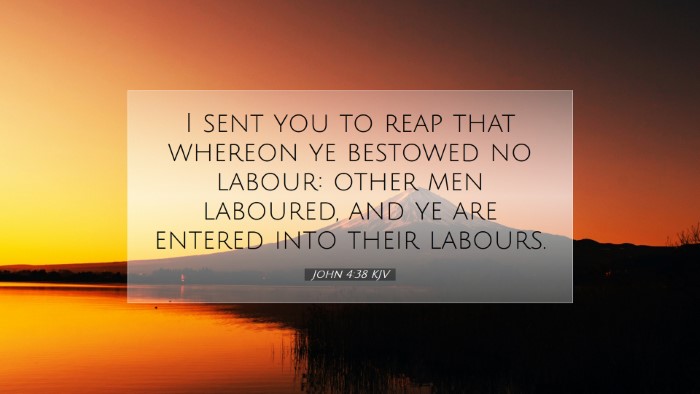Commentary on John 4:38
Verse: "I sent you to reap that whereon ye bestowed no labor: other men labored, and ye are entered into their labors."
Introduction
In this profound statement made by Jesus to His disciples, we find a rich tapestry of meaning woven from themes of labor, harvest, and the fulfillment of divine purposes. The verse encapsulates the essence of evangelism and discipleship, highlighting the importance of collaboration in the Kingdom of God.
Contextual Background
This verse is situated within the narrative of Jesus' encounter with the Samaritan woman at the well. Following their dialogue, many Samaritans came to believe in Him, demonstrating the instrumental role of personal testimony in spreading the Gospel. Thus, this passage not only illustrates the immediate context of evangelistic labor but also sets the stage for broader theological implications regarding the mission of the Church.
Analysis of Key Phrases
-
"I sent you to reap"
Jesus speaks to His disciples concerning the work of reaping souls for His Kingdom. The harvest symbolizes the result of the labor of spreading the Gospel and the gathering of souls into eternal life. Here, "to reap" indicates the culmination of prior efforts and sets the disciples' mission within the context of God's great plan for reconciliation.
-
"whereon ye bestowed no labor"
This phrase underscores the gracious nature of God’s work. The disciples are invited to participate in a harvest that they did not cultivate. It emphasizes that spiritual awakening often comes through the efforts and sacrifices of others. This teaches humility and gratitude for those who went before.
-
"other men labored"
Often, the efforts of many saints pave the way for the work of others. This acknowledgment of previous laborers reminds the disciples of their duty to honor and build upon the foundation laid by others, linking the current work to a historic continuum of faithfulness in ministry.
-
"ye are entered into their labors."
The culmination of their work is a shared experience within the community of faith. This phrase calls attention to the cooperative effort in the Christian mission—each generation benefiting from the labor of the previous one, emphasizing that ministry is not an isolated endeavor but a collective journey.
Theological Implications
Theologically, this verse speaks to the mystery of God's redemptive purposes. It illustrates how God orchestrates the evangelistic efforts through various individuals across time and places. There is no solitary endeavor in God’s plan; each contribution, no matter how small, holds immense significance in the unfolding story of salvation.
Evangelism and Discipleship
The passage inspires a fresh perspective on evangelistic efforts, suggesting that the ultimate fruit of evangelism is often birthed through cumulative inputs from numerous workers. It calls for a spirit of collaboration rather than competition in the church. Albert Barnes notes that one's efforts in the Gospel are rarely in vain and are often amplified by the works of others, a theme echoed by Matthew Henry, who emphasizes the need for humility in recognizing that we are all part of a larger mission.
The Role of Prayer and Preparation
Before the believers reap the benefits, they should be committed to prayer and preparation. Adam Clarke notes the importance of prayerful dependence on God to prepare hearts for the harvest. This highlights the necessity of spiritual readiness and foresight in the pursuit of evangelism.
Encouragement for Believers Today
For modern believers, this text serves as a challenge and an encouragement. It reminds pastors and laypersons alike that they are part of a grand narrative in which their contributions matter. The labor of the Gospel is ongoing, and every small effort makes a difference. The Church is called to recognize and celebrate the labors of those who have come before while remaining committed to the mission of reaping souls for Christ.
Practical Applications
-
Humility in Service:
Acknowledge the sacrifices and labors of past and present believers. This cultivates an attitude of humility and gratitude, reminding us that we stand on the shoulders of giants of faith.
-
Embrace Collaboration:
Foster a spirit of collaboration within your church community. Encourage joint efforts in outreach and service projects, reflecting the cooperative nature of the Great Commission.
-
Prayer and Preparedness:
Invest time in prayer, asking God to prepare hearts for the Gospel, thereby enhancing your readiness to reap the harvest whenever opportunities arise.
-
Celebrate the Harvest:
Regularly celebrate the spiritual harvest within your community, giving thanks for the fruitful labor of previous generations and the blessing of seeing lives transformed by the Gospel today.
Conclusion
John 4:38 serves as both a reminder of the ongoing work of God's Kingdom and an encouragement for every believer. It teaches the importance of recognizing our place within the ongoing narrative of faith. By engaging with this truth, pastors, students, and scholars are equipped not only for personal growth but also for the collective mission of the Church, heralding the Good News and gathering a harvest of souls for eternity.


